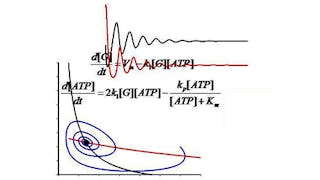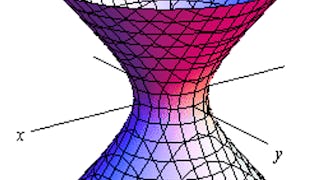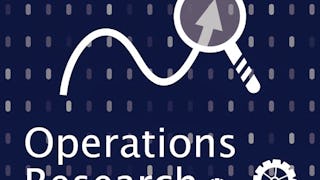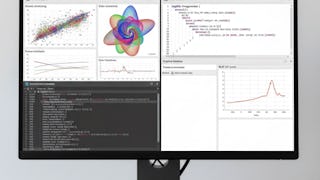Mathematical Modeling
Filter by
SubjectRequired *
LanguageRequired *
The language used throughout the course, in both instruction and assessments.
Learning ProductRequired *
LevelRequired *
DurationRequired *
SubtitlesRequired *
EducatorRequired *
Results for "mathematical modeling"
 Status: PreviewPreviewS
Status: PreviewPreviewSStanford University
Skills you'll gain: Physics, Timelines, Verification And Validation, Scientific Methods, Research, Mechanics, Mathematical Modeling, Systems Of Measurement
4.9·Rating, 4.9 out of 5 stars3.2K reviewsBeginner · Course · 1 - 3 Months

Skills you'll gain: Computational Thinking, Theoretical Computer Science, Mathematical Modeling, Dataflow, Mathematical Theory & Analysis, Systems Analysis, Performance Testing, Embedded Systems, Graph Theory, Technical Communication
4.4·Rating, 4.4 out of 5 stars44 reviewsMixed · Course · 1 - 3 Months
 Status: Free TrialFree TrialI
Status: Free TrialFree TrialIIcahn School of Medicine at Mount Sinai
Skills you'll gain: Matlab, Mathematical Modeling, Differential Equations, Computational Logic, Applied Mathematics, Simulations, Statistical Modeling, Biochemistry, Biology, Probability, Cell Biology, Physiology, Electrical Systems
4.7·Rating, 4.7 out of 5 stars222 reviewsMixed · Course · 1 - 3 Months
 Status: Free TrialFree TrialJ
Status: Free TrialFree TrialJJohns Hopkins University
Skills you'll gain: Integral Calculus, Numerical Analysis, Calculus, Probability, Applied Mathematics, Advanced Mathematics, Geometry, Mathematical Modeling
4.7·Rating, 4.7 out of 5 stars54 reviewsIntermediate · Course · 1 - 4 Weeks
 Status: Free TrialFree TrialJ
Status: Free TrialFree TrialJJohns Hopkins University
Skills you'll gain: Algebra, Arithmetic, Mathematical Modeling, Applied Mathematics, Graphing, Probability & Statistics
4.8·Rating, 4.8 out of 5 stars616 reviewsBeginner · Course · 1 - 3 Months
 Status: Free TrialFree TrialU
Status: Free TrialFree TrialUUniversity of Colorado Boulder
Skills you'll gain: Statistical Inference, Statistical Modeling, Regression Analysis, Data Ethics, Statistical Methods, Statistical Hypothesis Testing, Data Science, R Programming, Statistical Analysis, Data Modeling, Predictive Modeling, Mathematical Modeling, Probability & Statistics, Linear Algebra
Build toward a degree
4.4·Rating, 4.4 out of 5 stars30 reviewsIntermediate · Course · 1 - 3 Months
 Status: PreviewPreviewN
Status: PreviewPreviewNNorthwestern University
Skills you'll gain: Image Analysis, Digital Communications, Computer Vision, Visualization (Computer Graphics), Medical Imaging, Electrical and Computer Engineering, Telecommunications, Spatial Analysis, Matlab, Mathematical Modeling, Color Theory, Applied Mathematics
4.6·Rating, 4.6 out of 5 stars1.8K reviewsMixed · Course · 1 - 3 Months
 Status: Free TrialFree TrialU
Status: Free TrialFree TrialUUniversity of Minnesota
Skills you'll gain: Operations Research, Supply Chain, Workforce Management, Business Analytics, Applied Mathematics, Mathematical Modeling, Process Optimization, Manufacturing Operations, Operations Management, Workforce Planning, Financial Modeling, Business Analysis, Microsoft Excel, Resource Allocation, Finance, Analytics, Production Planning, Portfolio Management, Investment Management, Decision Making
4.8·Rating, 4.8 out of 5 stars54 reviewsBeginner · Course · 1 - 4 Weeks
 Status: Free TrialFree TrialI
Status: Free TrialFree TrialIImperial College London
Skills you'll gain: Mathematical Modeling, Epidemiology, Infectious Diseases, Statistical Modeling, Data Modeling, R Programming, Differential Equations, Statistical Methods, Public Health, Probability & Statistics
4.7·Rating, 4.7 out of 5 stars56 reviewsIntermediate · Course · 1 - 4 Weeks
 Status: Free TrialFree TrialI
Status: Free TrialFree TrialIImperial College London
Skills you'll gain: Epidemiology, Infectious Diseases, Mathematical Modeling, Public Health, R Programming, Differential Equations
4.8·Rating, 4.8 out of 5 stars273 reviewsIntermediate · Course · 1 - 4 Weeks
 Status: FreeFreeP
Status: FreeFreePPrinceton University
Skills you'll gain: Combinatorics, Algorithms, Theoretical Computer Science, Mathematical Theory & Analysis, Graph Theory, Data Structures, Advanced Mathematics, Mathematical Modeling, Probability
4.4·Rating, 4.4 out of 5 stars1K reviewsAdvanced · Course · 1 - 3 Months
 Status: Free TrialFree TrialC
Status: Free TrialFree TrialCColumbia University
Skills you'll gain: Derivatives, Mortgage Loans, Securities (Finance), Credit Risk, Financial Modeling, Risk Modeling, Financial Market, Mathematical Modeling, Securities Trading, Applied Mathematics, Investment Banking, Microsoft Excel, Risk Analysis, Probability, Cash Flows, Analysis
4.5·Rating, 4.5 out of 5 stars63 reviewsIntermediate · Course · 1 - 3 Months
Most popular
 Status: PreviewPreviewS
Status: PreviewPreviewSStanford University
Course
 Status: Free TrialFree TrialU
Status: Free TrialFree TrialUUniversity of Pennsylvania
Specialization
 Status: Free TrialFree TrialD
Status: Free TrialFree TrialDDuke University
Specialization
 Status: Free TrialFree TrialU
Status: Free TrialFree TrialUUniversity of Pennsylvania
Specialization
Trending now
 Status: Free TrialFree TrialU
Status: Free TrialFree TrialUUniversity of Pennsylvania
Specialization
 Status: Free TrialFree TrialD
Status: Free TrialFree TrialDDeepLearning.AI
Specialization
 Status: Free TrialFree TrialU
Status: Free TrialFree TrialUUniversity of Pennsylvania
Specialization
 Status: Free TrialFree TrialD
Status: Free TrialFree TrialDDuke University
Specialization
New releases
 Status: Free TrialFree TrialJ
Status: Free TrialFree TrialJJohns Hopkins University
Specialization
 Status: PreviewPreview
Status: PreviewPreviewCourse
 Status: Free TrialFree TrialN
Status: Free TrialFree TrialNNational Taiwan University
Specialization
 Status: Free TrialFree Trial
Status: Free TrialFree TrialSpecialization







